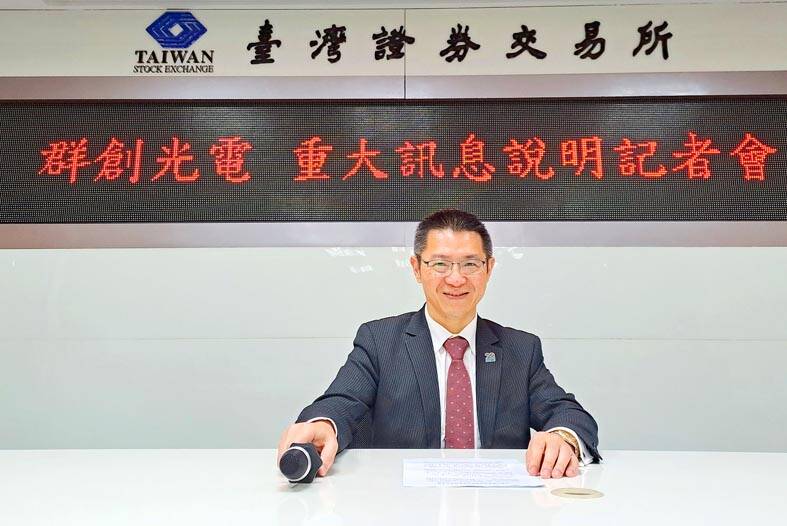Flat-panel maker Innolux Corp (群創) yesterday said its losses narrowed to NT$7.77 billion (US$254.5 million) last quarter from the prior quarter’s NT$12.39 billion, thanks to an unusual uptick in average selling prices (ASP) during the industry’s slow season.
Blended ASP climbed to US$240 per square meter, from US$235 in the prior quarter, the company said in a statement.
Innolux had expected prices to remain steady last quarter.

Photo: CNA
Gross margin improved to minus-7 percent last quarter, from minus-15 percent in the previous quarter.
Innolux expects the price uptrend to carry into the current quarter, benefiting from improving inventory buildup ahead of a shopping festival in China in June.
Panel shipments are expected to increase this quarter, Innolux said, adding that demand would continue improving from the second quarter.
The company also expects TV panel prices to climb further this quarter, while prices of some panels used in monitors would see a modest rebound, as customers’ inventory depletion is coming to an end.
Improving demand is expected to drive up blended ASP by about 5 percent this quarter from the previous quarter, the company said.
Shipments of TV, computer and monitor panels are to expand 12 to 13 percent sequentially this quarter, while those of small and medium panels would likely grow 12 to 13 percent, it said.
Separately, Innolux chairman Jim Hung (洪進揚) said the company’s board of directors has approved a 5 percent capital reduction in cash to enhance shareholders’ return on equity and to improve the company’s capital structure.
Shareholders would receive a payback of NT$0.5 per common share after the share cancelation, Hung told a news conference at the Taiwan Stock Exchange yesterday.
Innoloux’s capital would decline to NT$90.79 billion following the capital reduction, he said.
The capital reduction proposal is subject to approval by shareholders during the annual shareholder’s meeting on May 31.
Innolux also decided not to distribute dividends this year after reporting a loss of NT$27.99 billion for last year, its first annual loss in about a decade, amid an industry slump caused by oversupply, Hung said.

Zhang Yazhou was sitting in the passenger seat of her Tesla Model 3 when she said she heard her father’s panicked voice: The brakes do not work. Approaching a red light, her father swerved around two cars before plowing into a sport utility vehicle and a sedan, and crashing into a large concrete barrier. Stunned, Zhang gazed at the deflating airbag in front of her. She could never have imagined what was to come: Tesla Inc sued her for defamation for complaining publicly about the vehicles brakes — and won. A Chinese court ordered Zhang to pay more than US$23,000 in

Taiwan Semiconductor Manufacturing Co (TSMC, 台積電) yesterday held its first board of directors meeting in the US, at which it did not unveil any new US investments despite mounting tariff threats from US President Donald Trump. Trump has threatened to impose 100 percent tariffs on Taiwan-made chips, prompting market speculation that TSMC might consider boosting its chip capacity in the US or ramping up production of advanced chips such as those using a 2-nanometer technology process at its Arizona fabs ahead of schedule. Speculation also swirled that the chipmaker might consider building its own advanced packaging capacity in the US as part

‘NO DISRUPTION’: A US trade association said that it was ready to work with the US administration to streamline the program’s requirements and achieve shared goals The White House is seeking to renegotiate US CHIPS and Science Act awards and has signaled delays to some upcoming semiconductor disbursements, two sources familiar with the matter told reporters. The people, along with a third source, said that the new US administration is reviewing the projects awarded under the 2022 law, meant to boost US domestic semiconductor output with US$39 billion in subsidies. Washington plans to renegotiate some of the deals after assessing and changing current requirements, the sources said. The extent of the possible changes and how they would affect agreements already finalized was not immediately clear. It was not known

Taiwan Semiconductor Manufacturing Co (TSMC, 台積電) yesterday said that its investment plan in Arizona is going according to schedule, following a local media report claiming that the company is planning to break ground on its third wafer fab in the US in June. In a statement, TSMC said it does not comment on market speculation, but that its investments in Arizona are proceeding well. TSMC is investing more than US$65 billion in Arizona to build three advanced wafer fabs. The first one has started production using the 4-nanometer (nm) process, while the second one would start mass production using the